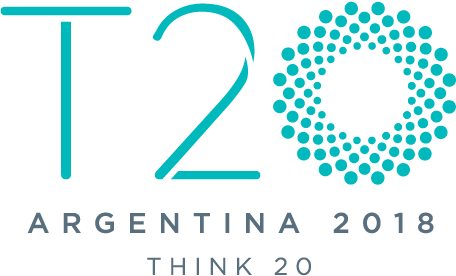The T20 Argentina associated event’s main objective was to exchange views and draw a shared road map between the experts that participated in both events.
On Thursday 30 September, a working session was held in CARI between officials from the T20 Summit and the 14th World Congress of Mediation and Culture of Peace. The main objective was to exchange views and outline a shared road map between the experts who participated in the both international events carried out in Argentina during the month of September.
The Executive Coordination Secretariat of CARI and the T20, Gustavo Martínez, opened the session emphasising that it was a T20 associated event due to the complementarity of the topics to be discussed.
For his part, Pablo Ava, co-chair of Policy and Research at the T20, made a presentation on how the Task Forces work, putting emphasis on those that work on topics related to mediation, negotiation and peace building. In this respect, the efforts made by Argentina to return to multilateralism in the international arena were considered to be key.
Later, Leopoldo Godio, member of CARI’s international law institute, moderated the panel and underlined the value mediation has as an important diplomatic practice to find peaceful solution to international conflicts.
Raquel Munt, the National Director of Mediation and Participatory Methods of Conflict Resolution, explained how the congress was to be structured, what were the main objectives it aimed to achieve and what points of synergy it has with the T20 Summit. On the latter point, she underlined the common efforts to create the conditions for social cohesions and global governance. In addition, she also referred to the 2030 Agenda from the United Nations Development Programme with emphasis on SDG 16 which refers to the promotion of more fair, peaceful and inclusive societies. Munt also proposed working on the concept of “positive peace” from J.P Lederach “a space, a time and a beneficial meeting of citizens for the reestablishment of interpersonal and group relations, favouring the creation of social systems that manage to satisfy the needs of the population and the constructive solution to conflict.”
Lastly, Bautista Logioco, the Programme Officer from the United Nations Peacebuilding Fund, took part. From his professional perspective, he considered the need to focus efforts on conflict prevention to build peace. He said that at the United Nations the concept of “Sustainable Peace” had already been incorporated,
Desde su perspectiva profesional ponderó la necesidad de focalizar esfuerzos en los estadios de prevención de conflictos para la construcción de paz. En este sentido, sostuvo como desde las Naciones Unidas ya se incorporó el concepto de “Paz Sostenible”, thereby introducing conflict prevention associated with peace building. He pointed out how important it is to develop indicators that mange to achieve the costs of conflicts to demonstrate how useful it is to work in its prevention. He referred to an initiative that aims to institutionalize dialogue for the prevention and transformation of complex social conflicts. The promoting group for this multisector initiative born in Argentina, is made up of experts from different sectors that are dedicated to peace building. To conclude, Logioco expressed that an institutionalization system of effective dialogue will require the involvement of not only state actors but also the private sector civil society and academia, where think tanks should have an active role.
The road map to integrate approaches, converge agendas and conclusions
The leading consensus reached in the meeting was was around creating a shared road map following the T20 Summit and 14th World Congress of Mediation and Culture of Peace taking place. The main objective will be to identify the conclusions and results from both events that could be an input for the T20 troika to carry out in Japan next year. In this respect, the work teams decided to keep an open agenda in order to create a policy paper on social cohesion, global governance and/or sustainable development.
